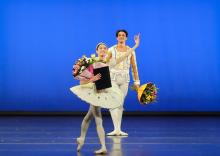
Response from Dutch National Opera & Ballet to report on misconduct in the dance world
On Monday, 22 May, a report was published by Bureau Verinorm about their investigation into unwanted and inappropriate behavior in the world of dance and dance sport.
The investigation was commissioned by the Ministry of Health, Welfare, and Sport (VWS) in response to reports of misconduct in the professional ballroom dance industry. The scope of the research was broadened to encompass all forms of dance and dance sport, on both a professional and amateur level, as well as the educational institutions associated with the dance industry.
We feel a great responsibility to prevent misconduct in (our part of) the dance world. For this reason, we fully cooperated with the investigation. The National Ballet Academy, with which we are closely affiliated, also participated in the research.
For Dutch National Opera & Ballet, creating a safe working culture is an absolute priority. The findings of the research once again highlight the importance of this issue. In the dance world, including ballet, there is an increased risk of unwanted and/or inappropriate behaviour. This is evident from the research data alone, which is reason enough to remain constantly vigilant, work towards a safe culture, and ensure the availability of appropriate tools and procedures in case incidents occur.
Furthermore, as indicated in the report, the world of professional ballet operates at the highest level, which places professional ballet dancers under high pressure and uncertainty about their careers. There can be an "unhealthy relationship with food," and "dancers can push themselves too hard, for example, by training with injuries," according to the report. The relationships between dancers and staff also play a role in the complex dynamics of the ballet world, which may prevent dancers from feeling free to speak out.
We recognise these specific issues within the ballet world and have therefore implemented our own measures in recent years. We established a Code of Conduct, developed in close consultation with our employees and workers' council, as well as a Complaints Procedure for Unwanted Behaviour. Additionally, we provide an external confidential advisor and a company social worker for our employees, thus reducing the threshold for addressing concerns. Our health team, which includes physiotherapists, a nutrition advisor and a psychologist, provides support to the dancers. Both dancers and artistic staff started a training programme in August 2022 that is focused on cooperation and trust. Several dialogue sessions have already taken place, which will be translated into concrete behavioural guidelines for in the studio and on stage, among other things. These initiatives enhance dancers' ability to address issues themselves. Simultaneously, with help from an external advisor, we are developing staff members' skills in recognising signals and becoming aware of the impact of their own behaviour, given their position. Furthermore, in relevant productions we now work with a professional intimacy coordinator, who has a lot of experience in the performing arts sector. She was involved in the production Dorian, which recently premiered. We also stimulate a safe working culture through other ongoing development programmes within Dutch National Opera & Ballet, such as training courses for production leaders and stage assistants on how to deal with transgressive behaviour, feedback skills workshops, and training courses for those in leadership positions.
As the largest institution in the professional dance industry, we feel a responsibility to keep engaging in discussions with all stakeholders about how we can collectively contribute to a safe(r) working climate. This includes building upon our international conference, Positioning Ballet, which we organised for the third time earlier this year, where the topic of a safe working culture also plays an important role. Continuous attention to the issues raised in the report remains necessary, to continue learning and improving.



